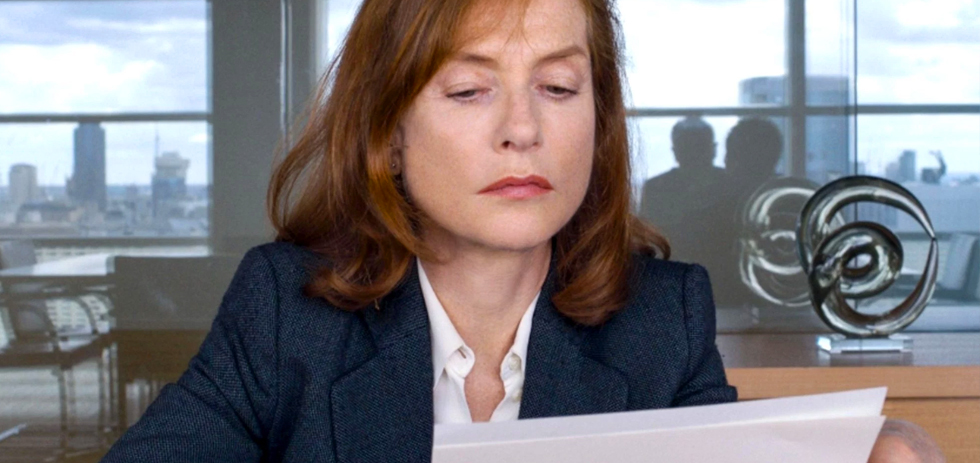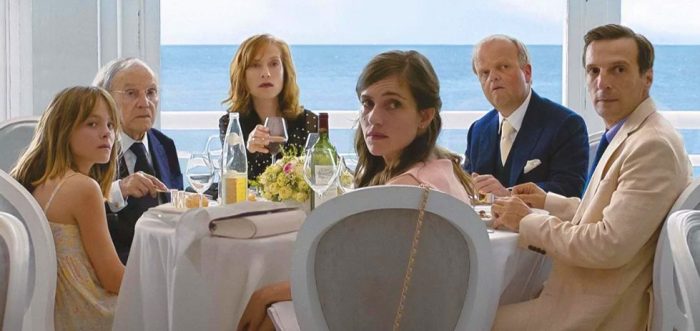
In an interview with The Paris Review, Michael Haneke accepts the allegation of being manipulative, but refuses to be called didactic. The self-reflexivity, scant exposition, and tonal neutrality of his films appear to belie any kind of didactic agenda—spectators are simply critically activated, their ensuing ethical evaluations derived from whatever histories that prefigure their perspectives. But a glance at his oeuvre suggests that conclusive moral verdicts regularly surface—that we must abjure the scopophilia of cinematic violence (Funny Games), that we must interrogate our guilt (individual and collective) or face potentially cataclysmic consequences (Caché). No one loves more the shock of an audience hit by their ugly complicity than Haneke.
Though formally demanding—we are tasked with following various characters who come and go, without much context—Happy End feels thematically easy for those familiar with Haneke’s work. The film unfolds like a curation of his favourite ideas from movies past, a self-referential object predictably filtered through the theme of bourgeois malaise. Where Funny Games and Caché are generically disruptive, Happy End phases through a gamut of family drama, thriller, documentary and dark satire, all subject to his distinctive clinical detachment.
Central to the film is the wealthy Laurent family, who own a construction business and live on a glorious estate near Calais, the Northern French port town linked to England by the Channel Tunnel. Reminiscent of the structural fragmentation in Code Unknown (2000), Haneke slots each family member into their own unpleasant narrative, with strands gradually converging as things go irremediably wrong. Anne Laurent’s (Isabelle Huppert) son, Pierre (Franz Rogowski), is caught in a potential civil liability claim following the death of an employee. Her father, Georges (Jean-Louis Trintignant), is suffering from dementia and an ever-growing death wish. Georges’ other son, Thomas (Matthieu Kassovitz), has taken in his daughter Ève (Fantine Harduin), from a previous marriage, after her mother is admitted to hospital. And Ève, all of twelve, is likely the one who put her there.
The political implications of setting a film in Calais are sidelined, a framing device likely intended to critique the real-life correlative of compassion fatigue, which blinds the lucky to marginalised plight. Since 1999, Calais has accommodated thousands of migrants and refugees, legal and illegal, clustered in “jungles” of shipping containers and slums around the city. Beyond the long security fence that guards the port, police have regularly cleared encampments, forcing continuous dislocation. Happy End allows the briefest incursions of a reality beyond white, middle-class myopia— Georges driving his wheelchair towards a group of black youths on a nondescript street; a distant altercation outside a housing complex, its walls a shade of pink too ostentatious to signal middle-class lodgings; Pierre’s drunken remarks about a member of the household staff, all of whom seem to be ethnically Arab. But Haneke’s pointed omission feels too obvious. Where his previous films have forced spectator introspection to almost unbearable effect, here, it’s tantamount to the observation that white Europe is—surprise!—probably xenophobic and racist. Wealthy white families—like the Laurents—probably aren’t burdened with the guilt of their material security.

There is, though, the suggestion that the family’s malaise is symptomatic of some reactionary claustrophobia, an insidious consequence of their insular bourgeois lives. The Laurents’ pathological dysfunction is masked by attempted performances of compassion in day-to-day situations. After a dog attack, Anne warmly comforts the young daughter of a Tunisian woman who works at the Laurent estate, but barely seems to interact with her fiancé, Lawrence (a comically cast Toby Jones). Thomas attempts to console Ève after her suicide attempt, but the online messages he exchanges with a mysterious woman betray some fundamental emotional perversion. Haneke doesn’t dwell long enough on any individual character for us to develop particular attachment, though Ève is arguably the most captivating, more the result of our morbid social fascination with child psychopathy than anything else.
While Haneke’s previous films often rely on specific moments of displeasure (often from visceral violence) to frustrate spectator desire, Happy End effects its discomfort by positioning the audience as omniscient. Much of this privileged information is relayed through distinctly uncinematic media; the film opens with a live-stream video of a woman finishing an evening bathroom routine, her every action heralded by a text message bubble. The same format reveals that Ève is poisoning her hamster with antidepressants, a trial run, she confesses, for her mother. There is the time-stamped security footage that mimics the opening shot of Caché, where we witness the accident at the Laurent construction site. Then, a Facebook messenger-style chat screen where Thomas exchanges adulterous erotic messages in real time. Where found footage films often aim to persuade with the appearance of technologically unmediated veracity, the sequences in Happy End provide information without purpose, our knowledge pointlessly invasive. This is precisely why the dramatic irony feels so uncomfortable—what we see only confirms the ultimate unknowability of these characters’ distorted desires, mysteries unfurling ad infinitum.
Admittedly, this inconclusive patchwork might be more effective if Haneke’s own films hadn’t already explored most of these themes with greater sophistication —there’s even a specific character reference to the euthanasia plot in Amour (2012). If this lack of an overarching conceit is indeed the “point”, it’s a weak one. At the hands of so perceptive a director, surely an intentional anticlimax should read as more than just a metatextual copout.
